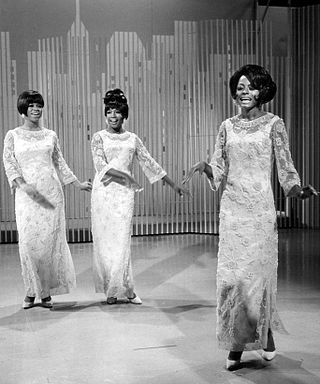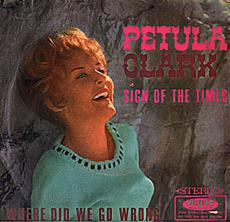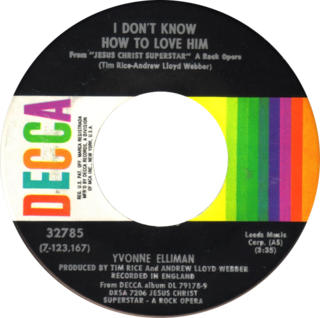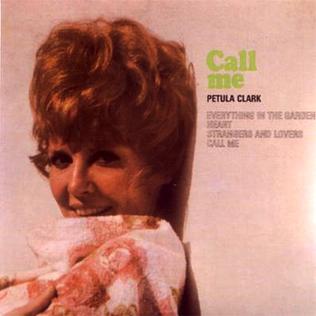
Petula Clark CBE is a British singer, actress, and songwriter. She started her professional career as a child performer and has had the longest career of any British entertainer, spanning more than 85 years.

"Downtown" is a song written and produced by English composer Tony Hatch. Its lyrics speak of going to spend time in an urban downtown as a means of escape from everyday life. The 1964 version recorded by British singer Petula Clark became an international hit, reaching number one on the Billboard Hot 100 and number two on the UK Singles Chart. Hatch received the 1981 Ivor Novello award for Best Song Musically and Lyrically.

"This Is My Song" is a song written by Charlie Chaplin in 1966, and performed by Petula Clark.

American girl group The Supremes has released 29 studio albums, four live albums, two soundtrack albums, 32 compilation albums, four box sets, 66 singles and three promotional singles. The Supremes are the most successful American group of all time, and the 26th greatest artist of all time on the US Billboard charts; with 12 number-one songs on the Billboard Hot 100 and three number-one albums on the Billboard 200. The Supremes were the first artist to accumulate five consecutive number-one singles on the US Hot 100 and the first female group to top the Billboard 200 albums chart with The Supremes A' Go-Go (1966). In 2017, Billboard ranked The Supremes as the number-one girl group of all time, publishing, 'although there have been many girl group smashes in the decades since the Supremes ruled the Billboard charts, no collective has yet to challenge their, for lack of a better word, supremacy.' In 2019, the UK Official Charts Company placed 7 Supremes songs—"You Can't Hurry Love" (16), "Baby Love" (23), "Stop! In the Name of Love" (56), "Where Did Our Love Go?" (59), "You Keep Me Hangin' On" (78), "Come See About Me" (94) and "Stoned Love" (99)—on The Official Top 100 Motown songs of the Millennium chart, which ranks Motown releases by their all-time UK downloads and streams.
"Barbara Ann" is a song written by Fred Fassert that was first recorded by the Regents as "Barbara-Ann". Their version was released in 1961 and reached No.13 on the Billboard Hot 100 chart. A more well-known version of the song was recorded by the Beach Boys for their 1965 in-house live album Beach Boys' Party! In December, "Barbara Ann" was issued as a single with the B-side "Girl Don't Tell Me", peaking at No. 2 in the U.S. and No. 3 in the UK.

"Anyone Who Had a Heart" is a song written by Burt Bacharach (music) and Hal David (lyrics) for Dionne Warwick in 1963. In January 1964, Warwick's original recording hit the Top Ten in the United States, Canada, Spain, Netherlands, South Africa, Belgium and Australia.

"Sign of the Times", also known as "A Sign of the Times", is a song performed by Petula Clark, featured on her album My Love and released as a single in March 1966. It was the follow-up to her #1 US hit "My Love," the title track from the aforementioned album, and it continued her association with writer/producer Tony Hatch and songwriter Jackie Trent. However, "Sign of the Times" had a more percussive sound than had been evident on Clark's previous singles, or than would become evident on her later ones.

"I Know a Place" is a song with music and lyrics by Tony Hatch. It was recorded in 1965 by Petula Clark at the Pye Studios in Marble Arch in a session which featured drummer Bobby Graham and the Breakaways vocal group.

"I Couldn't Live Without Your Love" is a 1966 single written by Tony Hatch and Jackie Trent and recorded by Petula Clark. It was inspired by the affair the songwriters were having at the time. Clark has cited "I Couldn't Live Without Your Love" along with "Don't Sleep in the Subway" as her favourite of her hits. “I still love that one; I do it onstage with great joy,” Clark told the "Montreal Gazette" in 2017.

"Who Am I" is a 1966 single by Petula Clark written by Tony Hatch & Jackie Trent and produced by Tony Hatch. By virtue of its title, "Who Am I" has long been the standard opening number for Clark's concerts. It also served as the centerpiece for the "Who Am I Medley", which opened Clark's 1968 U.S. television special.

"Colour My World" is a song written by Tony Hatch and Jackie Trent, and recorded by Petula Clark in 1966.

"Don't Sleep in the Subway" is a song written by Tony Hatch and Jackie Trent and recorded by the British singer Petula Clark, who released it as a single in April 1967.

"I Don't Know How to Love Him" is a song from the 1970 album and 1971 rock opera Jesus Christ Superstar written by Andrew Lloyd Webber (music) and Tim Rice (lyrics), a torch ballad sung by the character of Mary Magdalene. In the opera she is presented as bearing an unrequited love for the title character. The song has been much recorded, with "I Don't Know How to Love Him" being one of the rare songs to have had two concurrent recordings reach the top 40 of the Hot 100 chart in Billboard magazine, specifically those by Helen Reddy and Yvonne Elliman, since the 1950s when multi-version chartings were common.

"Call Me" is a song composed by Tony Hatch for an original recording for Petula Clark. It was later an easy listening standard via a hit version by Chris Montez.

"You're the One" is a song by Petula Clark with lyrics by Tony Hatch, recorded in 1965. It was later also included on the 1965 album I Know a Place. "You're the One" was a Top 30 hit on the UK Singles Chart for Clark, but was more successful as a top ten US single release by The Vogues.

My Love is an album released by Petula Clark; her first album to feature recording done in the United States, My Love was produced, arranged, and conducted by Tony Hatch. In the US, it was her fourth album licensed to Warner Bros. Records. After the single release of "A Sign of the Times" charted, new pressings of the album were titled A Sign of the Times/My Love.

The Other Man's Grass Is Always Greener is the ninth album released by Petula Clark in the United States. It entered the Billboard 200 on February 17, 1968 and remained on the charts for 23 weeks, peaking at #93. It fared better in the United Kingdom, where it reached #37.

"Kiss Me Goodbye" is a Les Reed/ Barry Mason composition recorded in 1968 by Petula Clark.

"So Sad (To Watch Good Love Go Bad)" is a song written by Don Everly, which was released by The Everly Brothers in 1960. The song was later a country hit for multiple artists in the 1970s and 80s.
"Sailor" is the title of the English-language rendering of the 1959 schlager composition "Seemann " originally written in German by Werner Scharfenberger and lyricist Fini Busch : featuring lyrics in English by Norman Newell, "Sailor" would in 1961 afford Petula Clark her first UK #1 hit, simultaneously granting Top Ten success to Anne Shelton while also bringing her chart career to a close. Clark was also afforded international success with both her recording of "Sailor" and also with Marin the French-language rendering of the song.


















